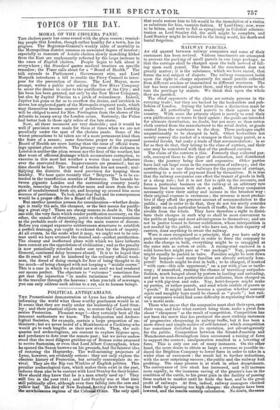TOPICS OF THE DAY.
MORAL OF THE CHOLERA PANIC.
Tan cholera panic has come round with the plum season; remind- ing people that London, though rather healthy for a town, has its plagues. The Registrar-General's weekly table of mortality in the Metropolitan district assumes an unwonted degree of interest ; especially as rumours of Asiatic cholera slowly marching hither from the East are unpleasantly reflected by the large increase in the cases of English cholera. People begin to talk about it everywhere ; the Standard quotes medical treatises on specific remedies; the Tisnes calls aloud for a "Board of Health." The talk extends to Parliament ; Government stirs, and Lord Morpeili introduces a bill to enable the Privy Council to inter- pose for the prevention of disease. The Lord Mayor, more prompt, writes a public note asking the New River Company to scour the drains in order to the purification of the City ; and his boon has been granted, not only by the New River Company, but also by Jupiter Pluvius to a pitch of redundancy. Indeed, Jupiter has gone so far as to overflow the drains, and establish in divers low neglected parts of the Metropolis stagnant pools, which may themselves become sources of pestilence ; and his Lordship will be obliged to send for Mrs. Partington from the shores of the Atlantic to sweep away the London ocean. Seriously, the Police had better look to those ugly relics of the late storm.
Now, all these measures are very desirable ; and it would be well if provision were made for them at times when we are not peculiarly under the spur of the cholera panic. Some of the wisest precautions to be taken are of a more permanent kind than the fears of a season ; some functions proper to the proposed Board of Health are more lasting than the issue of official warn- ings against plum surfeits. The primary cause of the sickness in London is neither the plum season nor the heat of the weather, but that want of efficient drainage which accumulates corruption, to exercise in this most hot weather a worse than usual influence over the enervated frame. Improvements are promised ; but no time should be lost. The spread of London has not ceased ; mul- tiplying the districts that need provision for keeping them healthy. We hear quite recently that "Belgravia" is to be ex- tended to the transfluvian marshes of Battersea. The bounds be- tween gigantic London and the surrounding country yearly recede, removing the town-dweller more and more from the re- gion of unadulterated fresh air, and heaping up around him more sources of pestilence. To look after that fact and its consequences would be a proper office for a Board of Health.
But another question presses for consideration—whether drain- age is really the sole, the cheapest, or the best means for purify- ing a great city? There are strong reasons to doubt it. On the one side, the very facts which render purification necessary, on the other, the annals of chemistry, point to chemical transmutations as the probable mode of destroying the main sources of disease. Before you compel expensive subterranean structures to establish a perfect drainage, you ought to exhaust that branch of inquiry. At all events, be the mode what it may, we ought not to be con- tent until we have attained the desired end—perfect purification. The clumsy and ineffectual plans with which we have hitherto been content are the opprobrium of civilization ; and as the penalty is now periodically recorded under our eyes by the Registrar- General, continued delay becomes absurd. It is to be hoped that the fit result will not be hindered by the ordinary official weak- ness, the dread of doing enough for fear of being thought to do too much—of being charged with not keeping a "middle course." .This is a case in which we should not rest until we had rendered our means perfect. The objectors to " extremes " sometimes for- get that the injunction "in medio tutissimus " was addressed to the traveller through the heavens : when you talk of sewerage, you can only address such advice to a rat, not to human beings.


























 Previous page
Previous page